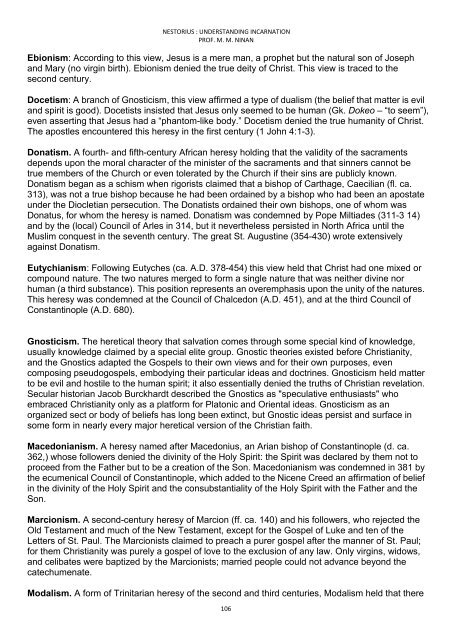Nestorius
Create successful ePaper yourself
Turn your PDF publications into a flip-book with our unique Google optimized e-Paper software.
NESTORIUS : UNDERSTANDING INCARNATION<br />
PROF. M. M. NINAN<br />
Ebionism: According to this view, Jesus is a mere man, a prophet but the natural son of Joseph<br />
and Mary (no virgin birth). Ebionism denied the true deity of Christ. This view is traced to the<br />
second century.<br />
Docetism: A branch of Gnosticism, this view affirmed a type of dualism (the belief that matter is evil<br />
and spirit is good). Docetists insisted that Jesus only seemed to be human (Gk. Dokeo – “to seem”),<br />
even asserting that Jesus had a “phantom-like body.” Docetism denied the true humanity of Christ.<br />
The apostles encountered this heresy in the first century (1 John 4:1-3).<br />
Donatism. A fourth- and fifth-century African heresy holding that the validity of the sacraments<br />
depends upon the moral character of the minister of the sacraments and that sinners cannot be<br />
true members of the Church or even tolerated by the Church if their sins are publicly known.<br />
Donatism began as a schism when rigorists claimed that a bishop of Carthage, Caecilian (fl. ca.<br />
313), was not a true bishop because he had been ordained by a bishop who had been an apostate<br />
under the Diocletian persecution. The Donatists ordained their own bishops, one of whom was<br />
Donatus, for whom the heresy is named. Donatism was condemned by Pope Miltiades (311-3 14)<br />
and by the (local) Council of Arles in 314, but it nevertheless persisted in North Africa until the<br />
Muslim conquest in the seventh century. The great St. Augustine (354-430) wrote extensively<br />
against Donatism.<br />
Eutychianism: Following Eutyches (ca. A.D. 378-454) this view held that Christ had one mixed or<br />
compound nature. The two natures merged to form a single nature that was neither divine nor<br />
human (a third substance). This position represents an overemphasis upon the unity of the natures.<br />
This heresy was condemned at the Council of Chalcedon (A.D. 451), and at the third Council of<br />
Constantinople (A.D. 680).<br />
Gnosticism. The heretical theory that salvation comes through some special kind of knowledge,<br />
usually knowledge claimed by a special elite group. Gnostic theories existed before Christianity,<br />
and the Gnostics adapted the Gospels to their own views and for their own purposes, even<br />
composing pseudogospels, embodying their particular ideas and doctrines. Gnosticism held matter<br />
to be evil and hostile to the human spirit; it also essentially denied the truths of Christian revelation.<br />
Secular historian Jacob Burckhardt described the Gnostics as "speculative enthusiasts" who<br />
embraced Christianity only as a platform for Platonic and Oriental ideas. Gnosticism as an<br />
organized sect or body of beliefs has long been extinct, but Gnostic ideas persist and surface in<br />
some form in nearly every major heretical version of the Christian faith.<br />
Macedonianism. A heresy named after Macedonius, an Arian bishop of Constantinople (d. ca.<br />
362,) whose followers denied the divinity of the Holy Spirit: the Spirit was declared by them not to<br />
proceed from the Father but to be a creation of the Son. Macedonianism was condemned in 381 by<br />
the ecumenical Council of Constantinople, which added to the Nicene Creed an affirmation of belief<br />
in the divinity of the Holy Spirit and the consubstantiality of the Holy Spirit with the Father and the<br />
Son.<br />
Marcionism. A second-century heresy of Marcion (ff. ca. 140) and his followers, who rejected the<br />
Old Testament and much of the New Testament, except for the Gospel of Luke and ten of the<br />
Letters of St. Paul. The Marcionists claimed to preach a purer gospel after the manner of St. Paul;<br />
for them Christianity was purely a gospel of love to the exclusion of any law. Only virgins, widows,<br />
and celibates were baptized by the Marcionists; married people could not advance beyond the<br />
catechumenate.<br />
Modalism. A form of Trinitarian heresy of the second and third centuries, Modalism held that there<br />
106

















